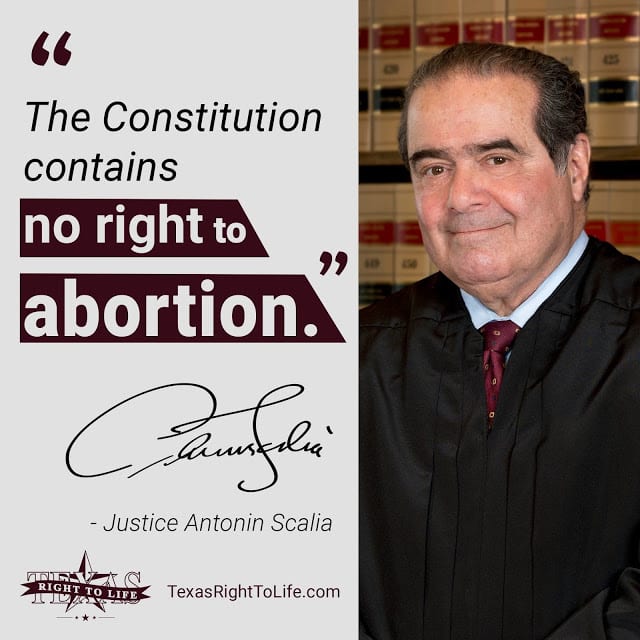After Supreme Court Justice Antonin Scalia died this weekend, prominent voices from both sides of the political divide praised his character, acuity, and unwavering commitment to the United States Constitution. An outspoken constitutional textualist, Scalia decried the 1973 Supreme Court decision which created a right to elective abortion on-demand and eviscerated the democratic process which allowed individual states to protect innocent human Life.
A staunch defender of the Constitution’s original integrity, Scalia devoted his life in service to the core principles and the freedoms the Constitution was intended to secure. In a moving tribute to Justice Scalia, Governor Greg Abbott called him “the solid rock who turned away so many attempts to depart from and distort the Constitution.”
A descendent of Italian immigrants, Antonin Scalia was born in New Jersey in 1936. An only child, Scalia and his wife, Maureen, welcomed nine children. Growing up, Scalia attended prestigious universities, including Georgetown and Harvard, and worked under several presidents before President Reagan appointed him to the D.C. Circuit Court. Four years later, Reagan would appoint Scalia to the Supreme Court of the United States.
Justice Scalia’s associate on the Supreme Court, Ruth Bader Ginsburg, issued a moving tribute proving that Scalia’s conservative values did not preclude genuine friendship and dialogue with ideological opponents. Ginsburg praised Scalia’s piercing legal analyses, which, she says, often helped her to flesh out her own (opposing) opinions:
From our years together at the D.C. Circuit, we were best buddies. We disagreed now and then, but when I wrote for the Court and received a Scalia dissent, the opinion ultimately released was notably better than my initial circulation. Justice Scalia nailed all the weak spots—the 'applesauce' and 'argle bargle'—and gave me just what I needed to strengthen the majority opinion. He was a jurist of captivating brilliance and wit, with a rare talent to make even the most sober judge laugh.
Pro-Life leaders have likewise honored Justice Scalia’s memory with fond recollections of his commitment to the Right to Life as a fundamental principle of American governance. Charmaine Yoest, President of Americans United for Life, astutely observed that Justice Scalia’s principles transcended the popular opinions that so often spurred unconstitutional judicial activism in Scalia’s lifetime, saying that Scalia “valued the Constitution over the whims of pop culture.”
As a Supreme Court Justice, Scalia observed his duty to provide a constitutional – as opposed to a moral or ideological – rationale for his opposition to Roe v. Wade, arguing that the majority opinion in the case trampled the Constitution’s Due Process Clause found in the Fourteenth Amendment. In a 2012 interview with CNN’s Piers Morgan, Scalia unpacked the unconstitutional theories on which Roe v. Wade was built:
[T]he theory that was expounded to impose that decision was a theory that does not make any sense, and that is, namely, the theory of substantive due process. There’s a Due Process Clause in the Constitution which says that no person shall be deprived of life, liberty, or property without Due Process. That is obviously a guarantee, not of life; not of liberty; not of property – you can be deprived of all of them – but not without Due Process. My Court in recent years has invented what is called substantive due process by saying some liberties are so important that no process would suffice to take them away, and that is the theory used in Roe v. Wade. It’s a theory that is simply a lie.
Justice Antonin Scalia was a great defender of Life, believing in the strength of America’s founding documents to see America through the storms of changing culture. His contribution to America’s history and greatness will not be forgotten.


